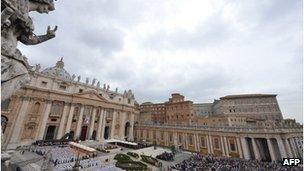Italy plans to tax Vatican on commercial properties
- Published

The Vatican owns about 20% of Italy's properties
Italy's Catholic Church faces an annual multi-million euro bill over government plans to strip it of its tax-exempt status.
Prime Minister Mario Monti has announced the Vatican must pay taxes on non-religious property, from which it previously enjoyed an exemption.
The annual cost could be up to 720m euros ($945m; £598m) according to municipal government bodies.
Italy's Catholic Church has 110,000 properties, worth about 9bn euros.
It includes shopping centres and a range of residential property.
In December, the government reintroduced a tax paid by anyone who owns land or property in Italy - which the Church does not pay.
But a growing wave of Italians are opposed to what they see as special privileges in the face of a tightening economy.
Following their government's latest austerity measure package, more than 130,000 people signed an online petition calling for the Church's tax exempt status to be revoked.
Since 2005, church-run groups and organisations have not been classed as official commercial bodies and have been exempt from paying property tax.
According to the Corriere della Sera newspaper, tax authorities will calculate how much of a property is used purely for religious purposes and tax it proportionately.
This means a church would remain exempt but a chapel which operates an hostel would pay tax accordingly.
Earlier this week, new figures showed Italy has entered recession, after two consecutive quarters of negative growth between July and December 2011.
- Published15 February 2012
- Published14 February 2012